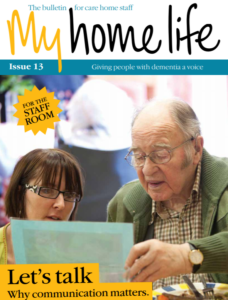World Alzheimer’s Day – let’s talk about dementia
We are supporting this year’s theme for World Alzheimer’s Day 2020 – let’s talk about dementia.
Around 70% of people living in care homes are living with a form of dementia. For people who have a diagnosis of dementia confirmed as early as possible, planning with family, friends and/or a support organisation, although often difficult, gives someone the chance to explore what is available and to start to plan for the future.
Care homes can provide a really positive option at an agreed point in time. For other people, moving to a home can be triggered by some form of ‘crisis’. Although not always a planned choice, we know the impact that great relationship centred support in a care home can have for all that live there.

The best practice examples we collect as part of our work at My Home Life are led by people who work in care homes. Many of them focus on working alongside people with dementia and their families, friends and community connections. Some are shared in our bulletin – ‘giving people with dementia a voice’.
Throughout the pandemic it was a privilege for My Home Life England to hear many individual examples of excellent and innovative practice from people working with people with dementia. It was (and still is) really hard for care homes to balance:
- adapting to daily changes in what was happening
- working with empathy and compassion
- keeping connections with families, supporters and friends who are part of the care home community
… but we heard many examples from across the country of the warm and compassionate ways care home managers were doing so. We highlighted a selection of these in episode 7 of our Conversations with Care Homes series.
These challenges haven’t gone away and there is now a new lens on care homes and the people who live and work in them. It’s still important to remember that a care home is just that – a home. Whilst the people who live there often need high levels of support and care, the moments of continuous connection that happen in homes where people are living together 24 hours a day are vital.
Amazing innovation exists in thinking about design and environment that support people with dementia to have as much choice and control as possible. This innovation is often led by care homes. However, it is relationships and confident support that are at the heart of a great quality of life, and again examples of brilliant practice are often led by the care home community.

Whilst it remains tough for people who live, work and visit care homes to keep positive connections going, we know that there is a new and positive focus on working together in different ways.
For example, one potential benefit is a new relationship with one identified named clinician supporting each home. We know that some people who live in care homes do not have a formal diagnosis of dementia or of the type of dementia. Diagnosis is instead assumed and people “just know”. By having a named clinician linked with each home, there is the potential for everyone to have a clear diagnosis and build an even more personalised approach, linked to the specific type of dementia diagnosed.
Back to this year’s theme “let’s talk about dementia” – talking about, and understanding, dementia is still something that society needs to do more of. For some people the idea of a diagnosis of dementia is something they don’t want to consider. Equally, for many, talking about care homes can be just as hard to do.
We must take the opportunity that the last few months has given us to keep talking about dementia and keep talking about the positive role care homes can have.
In some ways, living with a different, unexpected reality over the past few months, detached from our usual means and methods of communication and interaction has given a glimpse into the world of a person living with dementia. We hope that this leads to greater sensitivity to, and understanding of, the experiences of those living with dementia and greater kindness as a result.
Finally, we’d like to share this beautiful poem by Danuta Lipinska which is based on care home visits resuming for a person living with dementia. Danuta is a My Home Life facilitator and is also a counsellor and specialist in dementia care, experienced in supporting people living with dementia, their families and professionals who support them:
HOMECOMING
Let me come alongside you now with gentleness and humility, unhurried and quiet, after so long.
Not knowing or understanding the kind of world you created for yourself while I’ve been away. (Did you notice that I’ve been away?)
Maybe in time I can win your trust, your friendship and maybe even your heart.
But if that is absent, I will still come.
If you let me.
I will come because I am “The Keeper of The Memories”.
Keeping ‘us’ alive, even though our dance was interrupted.
Hard as this might be for me, (and it will be), there are others I can talk to about me, and the absence of ‘us’.
Whether I had been present or not over these past months, the tangles and plaques would have continued their relentless progress. I like to imagine that my particular presence might have made a difference to your every day.
But maybe not.
And that’s OK. (at least that’s what I tell my lonely heart).
Because there was love here.
And caring and respect.
Hands-free tenderness.
Eyes that beamed kindness right into your soul.
And cake.
How fortunate am I, that these women and men who came night and day when I could not, stood in the gap where I used to be.
Gratitude is too small a word.
But now I can come back, and together we can learn new dance steps to a tune of our own making.
Shy at first, we eye each other from the chairs along the wall.
Then one day, a while from now, I tentatively hold out my hand, palm upturned.
“Would you like to dance?” I ask, smiling into your eyes.
You place your hand in mine and sparkle back.
“I thought you’d never ask.”
Danuta Lipinska
8 June 2020